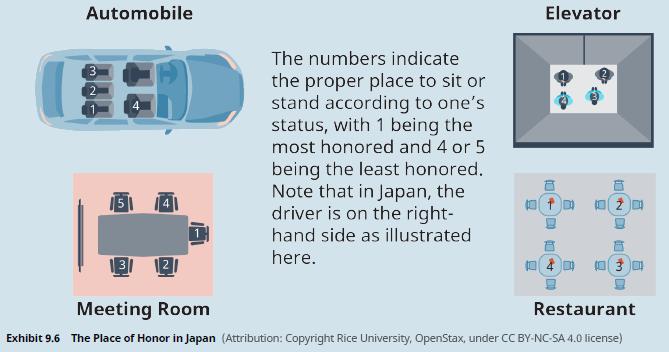In Japan, etiquette is not simply a prescription for appropriate social responses, it is a complete guide
Question:
In Japan, etiquette is not simply a prescription for appropriate social responses, it is a complete guide to conducting oneself in all social interactions. At the root of this system of social interaction is one’s status within the organization and society.
The effects of status in Japan can be seen in many ways. For example, when two businesspeople meet for the first time, they exchange business cards—before they even say hello to each other. After carefully reading the cards, each knows precisely the other’s rank (and status) in the organizational hierarchy and, thus, how to respond. The person with the lower status must bow lower than the person with the higher status.
Moreover, when four managers get into a car, status determines where each will sit. This is shown in Exhibit 9.6, where it can be seen that the most important (highest-status) manager will sit in the back seat, directly behind the driver. Similarly, when four managers enter an elevator, the least senior stands in front of the elevator controls, with the most senior behind. In a meeting room or in a restaurant, the most honored seat is farthest from the door, whereas the least honored is nearest the door. Even within the meeting room itself, a sofa is considered higher in rank than armchairs.

Clearly, status plays an important role in Japanese (and several other East Asian) societies. Status recognizes age (an important cultural variable in these societies) and tells everyone involved how to behave. Though such prescriptive practices may seem strange to many Westerners, it is quite natural in Japan. In fact, many Japanese feel such guidelines are helpful and convenient in defining social relationships, avoiding awkward situations, and making business transactions more comfortable and productive. Whether or not this perception is accurate, status systems are a fact of life that must be recognized by Western managers attempting to do business in Asia. Failure to understand such social patterns puts the Western manager at a distinct disadvantage.
Step by Step Answer:






